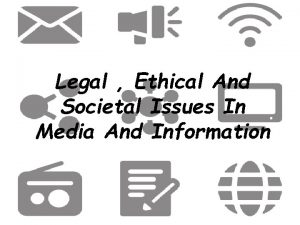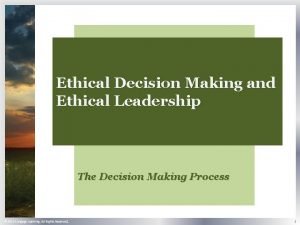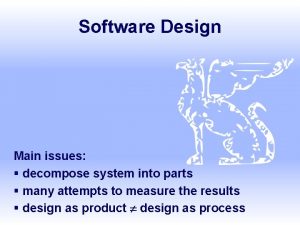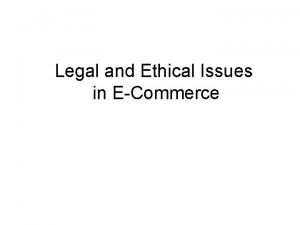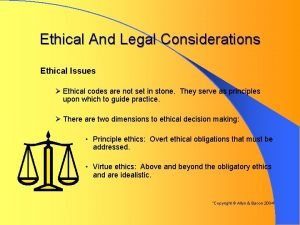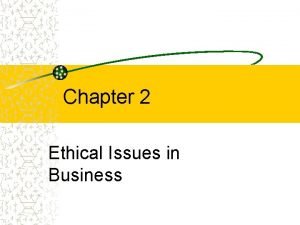Professionalism and Ethical Issues in Engineering Design Fathinul










- Slides: 10

Professionalism and Ethical Issues in Engineering Design Fathinul Syahir Ahmad Saad

Professionalism and Ethical Issues in Engineering Design • Concepts of professionalism and ethics in engineering design including the usage of standards, code of ethics, intellectual properties and liability.

Professional Responsibility • The social force that binds you to your obligations and the courses of action demanded by that force • Profession 1. The body of people in a learned occupation. 2. An occupation requiring special education (especially in the liberal arts or sciences)

Rules of Professional Responsibility • Registration for PE’s (BEM) • Five major sections : 1. Responsibility to the Public 2. Competency for Assignments 3. Conflict of Interest 4. Improper Conduct 5. Uphold integrity of profession

Code of Ethics - Fundamental Principles • Engineers uphold and advance the integrity, honor, and dignity of the Engineering profession by: I. Using their knowledge and skill for the enhancement of human welfare; II. Being honest and impartial, and serving with fidelity the public, their employers and clients; and III. Striving to increase the competence and prestige of the engineering profession

• There are two major ethics theories that attempt to specify and justify moral rules and principles: utilitarianism and deontological ethics. • Utilitarianism (also called consequentialism) is a moral theory developed and refined in the modern world in the writings of Jeremy Bentham (1748 -1832) and John Stuart Mill (1806 -1873).

Ethics - Utilitarian theory • Utilitarianism is a theory in normative ethics holding that the proper course of action is the one that maximizes utility, usually defined as maximizing total benefit and reducing suffering or the negatives.

Utilitarian theory The Basic Idea of Utilitarianism The Greatest Happiness Principle: “Actions are right in proportion as they tend to promote happiness, wrong as they tend to produce the reverse of happiness” –John Stuart Mill Happiness = pleasure, and the absence of pain Unhappiness = pain, and the absence of pleasure Happiness is the only thing that has intrinsic value

Utilitarian theory Utilitarianism is a form of consequentialism Consequentialism: Whether an action is morally right or wrong depends entirely on its consequences. An action is right if it brings about the best outcome of the choices available. Otherwise it is wrong. The Good: Things (goals, states of affairs) that are worth pursuing and promoting. The Right: the moral rightness (or wrongness) of actions and policies. Consequentialists say that actions are Right when they maximize the Good

END
 Gene pharming
Gene pharming Ethical issues in mechanical engineering
Ethical issues in mechanical engineering Ethical issues in experimental research
Ethical issues in experimental research Resourceful citer
Resourceful citer Law and ethics in information security
Law and ethics in information security Ethical habits
Ethical habits Design issues in software engineering
Design issues in software engineering Legal issues of ict in education
Legal issues of ict in education What is ethical issues in e commerce
What is ethical issues in e commerce Legal and ethical issues in computer security
Legal and ethical issues in computer security Ethical and legal issues involved in practicum
Ethical and legal issues involved in practicum



